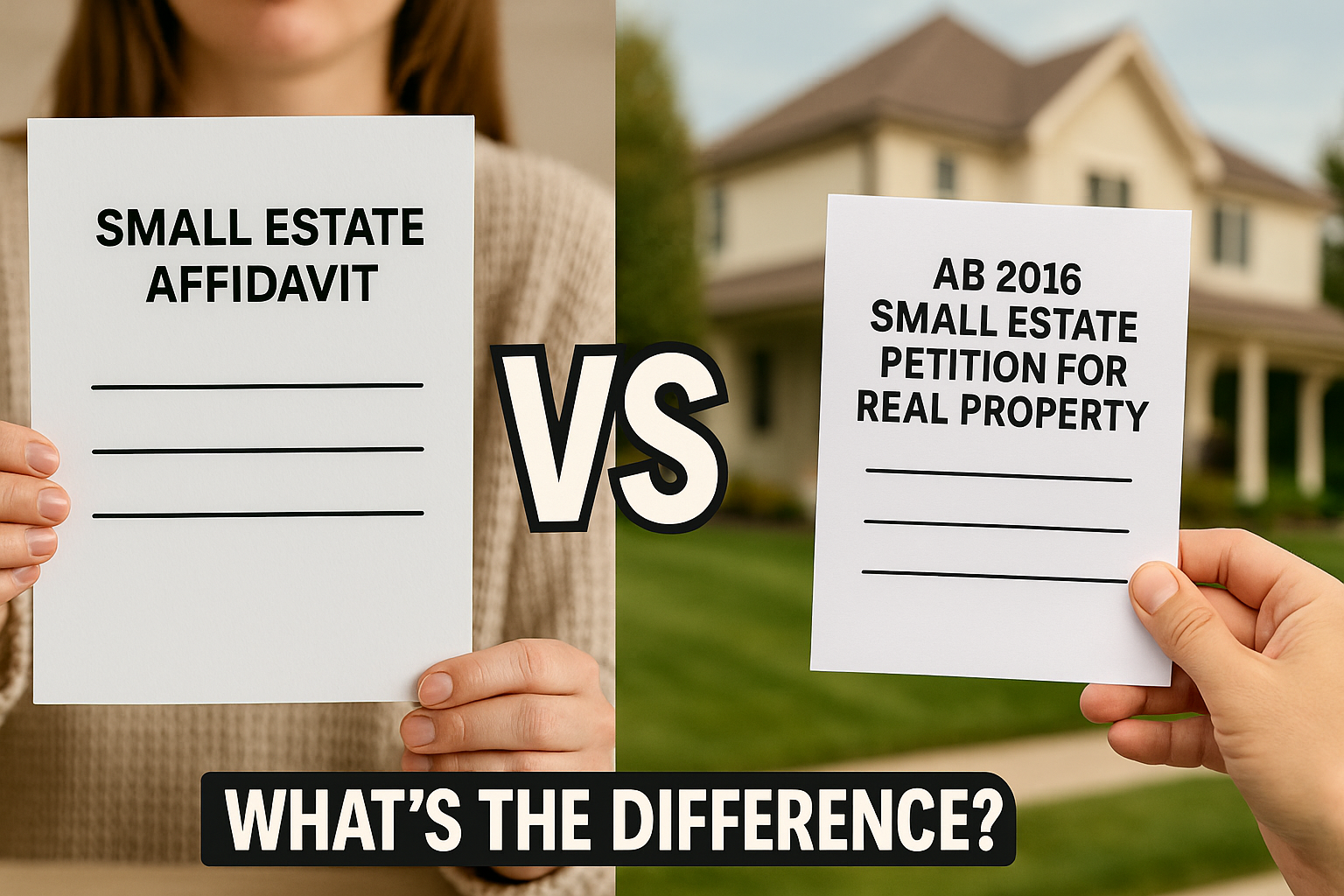Navigating the probate process in California can be daunting, especially when dealing with modest estates. Fortunately, California law provides simplified procedures for transferring assets without undergoing full probate. Two primary tools are:
- Small Estate Affidavit (Probate Code §13100)
- AB 2016 Small Estate Petition for Real Property (Probate Code §§13151–13154)
Understanding the distinctions between these procedures is crucial to ensure a smooth asset transfer.
1. Small Estate Affidavit (Probate Code §13100)
Purpose:
Allows heirs to collect the decedent's personal property without formal probate.
Applicable Assets:
- Bank accounts
- Vehicles
- Stocks and bonds
- Personal belongings
- Other tangible personal property
Eligibility Criteria (As of April 1, 2025):
- Total estate value (excluding real property) must not exceed $208,850 .
- Time requirement: Must wait at least 40 days after the decedent's death before using this procedure.
- No real property: Cannot be used to transfer real estate.
Procedure:
- Complete an affidavit stating entitlement to the property.
- Provide the affidavit to the institution or person holding the property, along with a death certificate.
- No court filing is necessary.
2. AB 2016 Small Estate Petition for Real Property (Probate Code §§13151–13154)
Purpose:
Facilitates the transfer of a decedent's primary residence without full probate.
Applicable Assets:
- Primary residence of the decedent located in California.
Eligibility Criteria (As of April 1, 2025):
- Fair market value of the primary residence must not exceed $750,000 .
- Time requirement: Must wait at least 40 days after the decedent's death before filing the petition.
- Primary residence only: Does not apply to other real estate holdings.
Procedure:
- File a petition in the probate court of the county where the property is located.
- Include:
- Death certificate
- Property appraisal by a probate referee
- Legal description of the property
- Names and addresses of all heirs and beneficiaries
- Notify all heirs and beneficiaries within five business days of filing the petition .
- Obtain a court order transferring the property to the rightful heirs.
Comparison Table
| Feature | Small Estate Affidavit | AB 2016 Petition for Real Property |
|---|---|---|
| Asset Type | Personal property only | Primary residence (real property) |
| Value Limit | $208,850 | $750,000 |
| Waiting Period | 40 days after death | 40 days after death |
| Court Involvement | No | Yes (simplified court process) |
| Real Estate Included? | No | Yes (primary residence only) |
| Notification Required? | No | Yes (to all heirs and beneficiaries) |
| Appraisal Required? | No | Yes (by probate referee) |
Practical Scenarios
Scenario 1:
Your aunt passed away, leaving behind a bank account with $50,000 and no real estate.
- Applicable Procedure: Small Estate Affidavit
Scenario 2:
Your father passed away, owning a primary residence valued at $700,000 and personal property worth $100,000.
- Applicable Procedures:
- AB 2016 Petition for the residence
- Small Estate Affidavit for personal property
Scenario 3:
Your grandmother passed away, owning a primary residence valued at $800,000.
- Applicable Procedure: Full probate process (exceeds $750,000 threshold)
Important Considerations
- Date of Death Matters: The applicable thresholds depend on the decedent's date of death. For deaths on or after April 1, 2025, the updated limits apply.
- Primary Residence Definition: The term "primary residence" is not strictly defined as the decedent's residence at the time of death. For instance, if the decedent was in a care facility but maintained a home, that home might still qualify as the primary residence .
- Inflation Adjustments: These thresholds are subject to adjustment every three years to account for inflation .
Final Thoughts
California's updated probate laws aim to simplify the asset transfer process for smaller estates, reducing the time and expense associated with full probate. By understanding and utilizing the appropriate procedures, heirs can efficiently manage estate settlements.
If you're navigating the complexities of estate administration, consider consulting with a probate attorney to ensure compliance with all legal requirements and to facilitate a smooth transfer of assets.
For personalized assistance or further information, feel free to reach out to our office.


